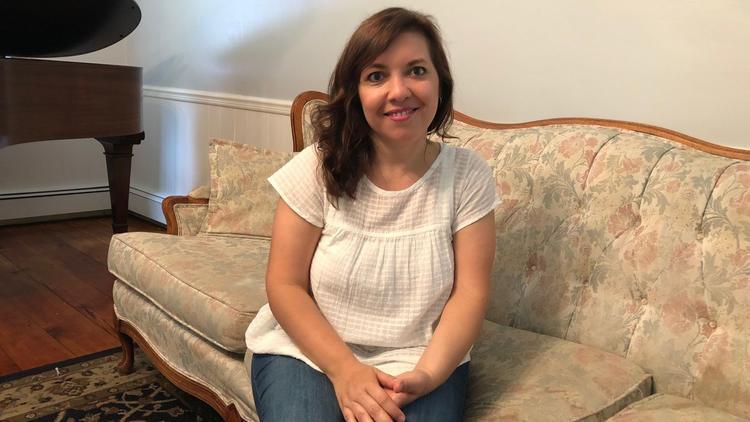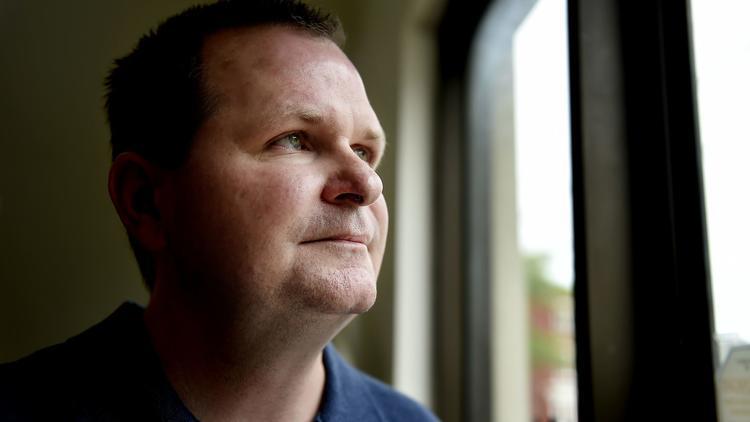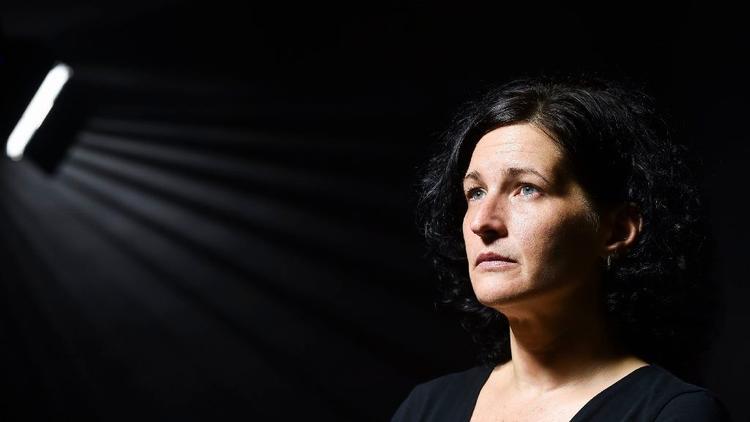|
Hearing others' stories, priest sex abuse survivors come forward with their own
By Tim Darragh, Riley Yates And Christine Schiavo
[with video] For the last 20 years, Diana Vojtasek could barely speak about the sexual abuse she says she suffered as a Catholic high school student during a vulnerable time in her life. When she married in 1997, her husband, Mark, didn’t know about what she would later describe as forced sexual encounters with a priest, who has since been defrocked. And when a civil lawsuit she filed in 2004 failed to advance because it missed a legal deadline, she said, “I just kind of went back into my little hole.” With three little children at the time, Vojtasek, who lives near Reading, said she became consumed with protecting herself and them. “Honestly, it was absolutely paralyzing,” she said. “For a time, I didn’t want to leave the house.” But the grand jury investigation into child sex abuse in six Catholic dioceses in Pennsylvania broke the dam holding Vojtasek’s fears and shame. In the month since the report went public, she and others who previously kept their abuse hidden have stepped forward as they find a supportive community. “Anytime you have a high-profile case of sexual assault, it almost always inspires people to disclose in one way or another,” said Kristen Houser, chief public affairs officer for the Pennsylvania Coalition Against Rape. “That might be making an official report to law enforcement or an institution. It might be sharing with friends and family for the first time.” The grand jury’s report, naming 301 allegedly abusive priests and conservatively estimating 1,000 victims, “validated” the struggles that silent survivors had been feeling, she said. “That creates an environment that many survivors have been waiting on,” she said. This week, the hotline established by state Attorney General Josh Shapiro for clergy sex abuse complaints topped 1,000 calls, a spokesman said. That gives a sense of the impact of the report and also how many people are “coming out of the woodwork,” said the spokesman, Joe Grace. Grace could not discuss what investigators are finding in the calls, but said agents would delve into complaints where appropriate — meaning, when they are within the statute of limitations. Some calls have come to attorneys and local district attorney’s offices. Richard Serbin, an Altoona attorney who has represented numerous sex abuse victims, said his office has fielded a number of calls in recent weeks from people alleging new cases of abuse. Immediately after the report’s Aug. 14 release, Northampton County District Attorney John Morganelli said his office received a handful of phone calls from people who said they were abused but did not want to give their names. At least seven reports of abuse were forwarded to him, largely from the Allentown Diocese, but also one from the Archdiocese of Philadelphia and another from a church in New York. The reports involve allegations that stretch as far back as the 1950s, Morganelli said. None contains accusations that can be investigated criminally, given the passage of time, he said. Survivors also have been calling the Allentown Diocese. Thirty-eight people have called its victim assistance coordinator (800-791-9209) in the month since the report came out, although not all were about sexual abuse, spokesman Matt Kerr said. Of those callers, he said, 26 said it was the first time they contacted the office. The long journey from scared victim to emboldened survivor likely will be repeated by hundreds, if not thousands, more people touched by the Pennsylvania scandal, said Mitchell Garabedian, the Boston lawyer who represented many abuse victims and was portrayed in the 2015 movie “Spotlight.” “Victims are going to be coming out because of the Pennsylvania report for decades to come,” he said. “This is not going to be done in one fell swoop.” Targeted in schoolAs a 16-year-old high school junior in 1990, Vojtasek was struggling emotionally as her parents’ marriage deteriorated. From her first day at Reading Central Catholic High School, she said, the Rev. James Gaffney took an intense, personal interest in her. On that first day, she said, Gaffney grabbed her in a crowded hallway, put his arm around her and told a nun, “Don’t we make a nice couple?” Vojtasek said. Under the guise of counseling, Gaffney — who had already faced questioning over inappropriate sexual relationships in the 1980s, according to the grand jury report — drew Vojtasek toward him in private settings, she said. He turned conversations to sexual matters and coerced her into having sex in parks, in a car and other places, she said. Called by subpoena to speak to the grand jury in 2016 and 2017, Gaffney admitted to having sex with at least one female student “in a car, on school property, and at other locations,” the report said. “Yes, it is possible” that he had sex with other minors, Gaffney told the grand jurors. He said he couldn’t remember specific details. Gaffney’s pursuit of Vojtasek continued after her high school years, with Gaffney writing letters to her while he was “in treatment,” she said. She would eventually leave Pennsylvania and then returned to the Reading area, still wracked with guilt and shame, and drinking to excess. When The Boston Globe’s 2002 Spotlight reporting put the story of sex abuse by priests in the headlines, Vojtasek’s buried feelings resurfaced. She and others filed civil complaints in 2004 against the diocese, but the cases never had a chance. Vojtasek turned 30 a few months before filing her complaint, making her too old to file a child abuse claim. Seeing the diocese’s legal reply to her complaint, denying all of Vojtasek’s claims, devastated her. “That absolutely crushed me, that they would deny every complaint I made, essentially calling me a liar,” she said. Again, she buried her feelings. But remarkably, she kept her faith. She found comfort in the Bible, and her Christian faith allowed her to forgive the church, even though, she says, she still has not received a personal apology. In 2016, the Pennsylvania attorney general’s office contacted her about speaking before the grand jury, which once again raised her anxieties. She then asked for and received approval for the diocese to cover the cost of her therapy. She is one of 31 people who have had their therapy paid for by the diocese since 2004, Kerr said. Her goal now, Vojtasek said, is to support other survivors and to let them know they can let go of their guilt and shame. “I can’t live in those fears anymore,” Vojtasek said. “I’m so tired of being this little girl cowering in a corner.” Meanwhile, Gaffney abandoned his ministry in 2002, the report says, and landed a teaching job at Albright College in Reading. The diocese did not warn the college of his background, it said. Gaffney resigned his teaching position in February 2017, a college spokeswoman said — in between his two appearances before the grand jury. He could not be reached for comment.
Man with a secret
David Zernhelt’s past is a troubled one, and he was in and out of psychiatric care throughout his adolescence. Many of his suicidal episodes played out in public, with newspaper articles from the early 1990s documenting the Allentown teen’s several run-ins with the law, including a case in which he pleaded guilty to the indecent assault of a 13-year-old girl. But missing from that story was a secret that, even today, is difficult for Zernhelt to talk about. For five years starting in the late 1980s when he was 13, Zernhelt said, he was sexually abused by the Rev. Thomas J. Kerestus, his family’s pastor at Sacred Heart parish in Allentown. To this day, most of his family know nothing about what he endured, he said. “It destroyed a lot of my life,” Zernhelt, 44, said in his first public account of the abuse. “I’m ashamed. I’m ashamed that the church tucked it under the rug. I’m ashamed that no one came back and ever apologized.” The grand jury’s report references Zernhelt — though not by name — as one of three victims of Kerestus, who was 72 when he died in 2014 at Holy Family Villa in Bethlehem, a retirement community for priests. But unlike many of those who shared their stories with the grand jury, Zernhelt was unaware his case was in the Allentown Diocese’s secret files until contacted this month by a reporter. Citing the diocese’s records, the grand jury said Zernhelt reported his abuse to the church in October 1992 when he was 18 years old. In a phone call to St. Ann's rectory in Emmaus, Zernhelt named Kerestus, “spoke in detail about the relationship” and “sounded disturbed,” according to a memo sent to then-Bishop Thomas Welsh. Today, Zernhelt lives in the Easton area and has a 9-year-old son. He remains under psychological care, takes four medications a day, and sees a therapist every two weeks and a psychiatrist every month. Zernhelt said he wanted to speak publicly so that people would understand what he was going through at the time. He said he hopes his story inspires others to break their silence. “It still impacts my life today. I still get nightmares. I still get sad,” Zernhelt said. Despite his past, he said he is as happy as he can be. “I have no choice but to move forward,” Zernhelt said. “The here-and-now and the future, that’s what I have to focus on.” ‘I can’t go to church’Stephanie Bartek isn’t sure how old she was when her grandmother took her to a little house in the Coal Region, where the Rev. Joseph Sabadish apparently was expecting her. She vividly recalls a bed so tall she could barely see above the mattress. And Sabadish lying naked upon it. He had been a frequent guest at her grandmother’s house and had been assistant pastor at her grandmother’s church, Sacred Heart in Bethlehem Township. Another man, wearing a priest’s black clothes and white collar, was present, Bartek said, when the door closed behind her. “They told me he was sick and I had to make him feel better,” Bartek, 42, of Bethlehem, said. “I remember him saying he loved me, he loved God, and this is how I show I love God.” Bartek isn’t sure if that was the first time Sabadish sexually assaulted her or if she was too young to remember when it started. She knows there were other episodes in the years Sabadish was attached to her family, even joining them on vacations to the Jersey Shore. As a child, she tried to tell her family about the abuse but was “hushed,” she said. In 2014, she told her story to the Philadelphia Archdiocese, and she said it has been paying for her therapy since 2015. She also told it to the Bucks County Courier Times. And then to an agent with the state attorney general’s office. But when the grand jury report was released last month, Sabadish’s name wasn’t in it. “I just have to tell people,” she told The Morning Call last week. “It’s not a secret anymore. Telling is helping.” Sabadish died in 1999 at 80. In 2005, he was alleged in a Philadelphia grand jury report to have abused two children, a brother and sister, in the 1960s, years before he abused Bartek. Four times during his 54 years in the priesthood, archdiocesan records show, he was removed from ministry or on leave for health reasons. During one of those suspensions, which archdiocesan records show was between 1976-1979, Sabadish simultaneously was assigned to Sacred Heart in Bethlehem Township, where Allentown Diocese directories listed him as assistant pastor. Kerr, the Allentown Diocese spokesman, couldn’t say how Sabadish was allowed to serve at a parish while he was under suspension in another diocese. “All those who would have been involved in 1976 are deceased,” he said. “Therefore, we cannot reconstruct the decision-making process at that time.” According to the Philadelphia Archdiocese, Sabadish was suspended in 1976 for improperly handling parish money, spokesman Kenneth A. Gavin said. But the suspension was lifted that same year by Philadelphia Cardinal John Krol, Gavin said, enabling Sabadish, who was from Schuylkill County, to serve in Bethlehem Township. Bishop Joseph McShea, then head of the Allentown Diocese, accepted Sabadish, Gavin said, but later suspended him for again mishandling parish money. By the end of 1979, Sabadish was working at a parish in Chester, Delaware County. Gavin said that at the time of those transfers, there were no abuse allegations in Sabadish’s file. As for why Sabadish’s name doesn’t appear in the recent grand jury report, Grace, the attorney general’s spokesman, said the report “focused specifically on priests against whom [the grand jury] uncovered the most documentary evidence from the dioceses.” He noted that the grand jury heard accusations about more than 400 priests, though it identified only 301 by name. Archdiocesan records show Sabadish returned to ministry after his various leaves and suspensions, ending his career as parochial vicar at St. Stanislaus in Lansdale. Presiding over his funeral Mass there was Cardinal Anthony Bevilacqua, then archbishop of Philadelphia, according to an obituary in the Pottsville Republican. By contrast, Bartek spent the decades fighting heroin addiction and feelings of worthlessness. The grand jury investigations have helped her better understand what happened to her, she said, and to realize her story is one of many. “It’s good to know that it wasn’t me,” she said. “But it makes me sick that that many people had to live the hell on earth that I live.” A mother of two grown children, Bartek long ago severed ties with the church but still chokes up when talking about her faith. “I believe in the prayers and the songs and all that part of the church,” she said, through tears. “But I can’t go to church. I just can’t.” Contact: tdarragh@mcall.com
|
.
Any original material on these pages is copyright © BishopAccountability.org 2004. Reproduce freely with attribution.


